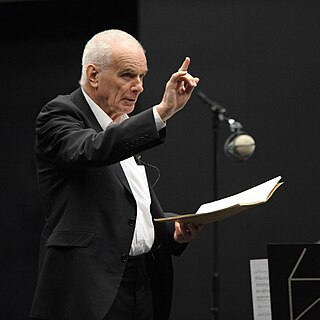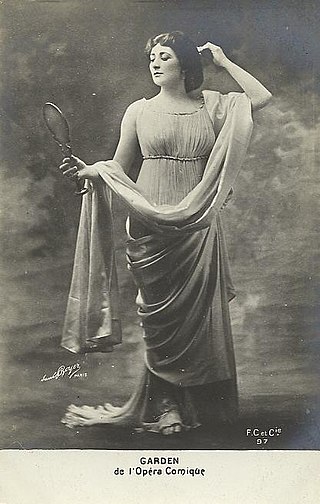Related Research Articles
A concerto is, from the late Baroque era, mostly understood as an instrumental composition, written for one or more soloists accompanied by an orchestra or other ensemble. The typical three-movement structure, a slow movement preceded and followed by fast movements, became a standard from the early 18th century.

The great Highland bagpipe is a type of bagpipe native to Scotland, and the Scottish analogue to the great Irish warpipes. It has acquired widespread recognition through its usage in the British military and in pipe bands throughout the world.

A piano concerto, a type of concerto, is a solo composition in the classical music genre which is composed for piano accompanied by an orchestra or other large ensemble. Piano concertos are typically virtuosic showpieces which require an advanced level of technique. Piano concertos are typically written out in music notation, including sheet music for the pianist, orchestral parts, and a full score for the conductor.

Sir Peter Maxwell Davies was an English composer and conductor, who in 2004 was made Master of the Queen's Music.
Sinfonia concertante is an orchestral work, normally in several movements, in which one or more solo instruments contrast with the full orchestra. It emerged as a musical form during the Classical period of Western music from the Baroque concerto grosso. Sinfonia concertante encompasses the symphony and the concerto genres, a concerto in that soloists are on prominent display, and a symphony in that the soloists are nonetheless discernibly a part of the total ensemble and not preeminent. Sinfonia concertante is the ancestor of the double and triple concerti of the Romantic period corresponding approximately to the 19th century.

Unicorn-Kanchana is a British independent record label founded by John Goldsmith, a former London police officer. Originally known as Unicorn Records, the name Kanchana was added later. In Hindu and Buddhist mythology, the female name Kanchana means an Apsara, a spirit of the clouds and waters.
This is a summary of 1985 in music in the United Kingdom, including the official charts from that year.

The St Magnus International Festival is an annual, week-long arts festival which takes place at midsummer on the islands of Orkney, off the north coast of mainland Scotland.
The Yellow Cake Revue is a musical composition for piano and voice. Peter Maxwell Davies composed the piece in 1980. He first performed it at the Stromness Hotel, in Stromness, Orkney, as part of the 1980 St Magnus Festival—a summer arts festival that he co-founded in 1977. English actress Eleanor Bron recited the spoken word portions for the debut performance.

The Symphony No. 6 by Peter Maxwell Davies was composed in Hoy during the first half of 1996, and was premiered on 22 June of the same year in the Phoenix Cinema, Kirkwall, as part of the twentieth St Magnus Festival, Orkney, by the Royal Philharmonic Orchestra conducted by the composer. The work was written with specific members of the RPO in mind, and is dedicated to the memory of the poet George Mackay Brown, who died on the day the symphony was completed.

The Symphony No. 4 by Peter Maxwell Davies was commissioned for the Scottish Chamber Orchestra by Christian Salvesen plc and composed in 1989. It is dedicated to the memory of the violinist John Tunnell, who had been leader of the orchestra, and was premiered at the Royal Albert Hall on a BBC Promenade Concert on 10 September 1989, with the composer conducting the Scottish Chamber Orchestra.

The Symphony No. 1 by Peter Maxwell Davies was composed between 1973 and 1976, and is dedicated to Sir William Glock, "as a mark of friendship and of appreciation of his work for contemporary music in his years as music controller at the B.B.C.". It was commissioned by the Philharmonia Orchestra, which gave the premiere of the symphony at the Royal Festival Hall, London, on 2 February 1978, with Simon Rattle conducting.

The Symphony No. 7 by Peter Maxwell Davies was composed in 2000. It was written for and dedicated to the BBC Philharmonic Orchestra, by whom it was premiered on 19 June 2000 at the St Magnus Festival, in the Pickaquoy Centre, Kirkwall, Orkney, conducted by the composer.

The Symphony No. 8 is an orchestral composition by Peter Maxwell Davies, completed on 15 December 2001.

Classical music in Scotland is all art music in the Western European classical tradition, between its introduction in the eighteenth century until the present day. The development of a distinct tradition of art music in Scotland was limited by the impact of the Scottish Reformation on ecclesiastical music from the sixteenth century. Concerts, largely composed of "Scottish airs", developed in the seventeenth century and classical instruments were introduced to the country. Music in Edinburgh prospered through the patronage of figures including Sir John Clerk of Penicuik. The Italian style of classical music was probably first brought to Scotland by the cellist and composer Lorenzo Bocchi, who travelled to Scotland in the 1720s. The Musical Society of Edinburgh was incorporated in 1728. Several Italian musicians were active in the capital in this period and there are several known Scottish composers in the classical style, including Thomas Erskine, 6th Earl of Kellie, the first Scot known to have produced a symphony.
Stepan Rostomyan is an Armenian composer. He is one of Armenia's key figures of the contemporary music scene, as well as a composer whose works have been performed and broadcast internationally.
Chieftain's Salute is a concerto in one movement for Great Highland Bagpipe and orchestra by Graham Waterhouse. The work is one of few to use the bagpipe with a classical orchestra. A version for bagpipe and string orchestra, Op. 34a, was composed in 2001. It is based on an earlier work for bagpipe and string quartet. Jacobean Salute was also derived from the early work, with a wind quintet replacing the bagpipe, published in 2003. A version for bagpipe and orchestra was composed and first performed in 2015.
The Violin Concerto No. 1 is the first violin concerto by the British composer Peter Maxwell Davies. It was commissioned by the Royal Philharmonic Orchestra to commemorate the ensemble's 40th anniversary. The work was completed in 1985 and first performed at the St Magnus Festival by the violinist Isaac Stern and the Royal Philharmonic Orchestra conducted by André Previn on 21 June 1986. The piece is dedicated to Isaac Stern.
Fenella Humphreys is a British classical violinist who specialises in classical and contemporary repertoire as both a soloist and chamber musician.
References
- ↑ Davies, Peter Maxwell Orkney Wedding, With Sunrise (CD notes) Collins Classics
- ↑ "Peter Maxwell Davies - An Orkney Wedding, with Sunrise (version for full orchestra)". Boosey & Hawkes. Retrieved 21 April 2024.
- ↑ Bayliss, Colin (ed.) The Music of Peter Maxwell Davies, Highgate Publications ISBN 0-948929-46-4